In the last year, GreenBuzz has been focusing on the ‘Sustainability Labs’ and so the event on December 6th was a welcome change back to the old ‘Sustainability Drinks’ format. The format is quite simple. We pick a topic and create an event around it, with interested individuals coming by to find out more about said topic, with the chance of networking later in the evening. The topic of the evening was food waste, which was the first event in a series surrounding food. Given that at Greenbuzz we hope to bring people together in an effort to inspire change, it seems only fitting that the location of the event was Venn in Friedrichshain. They are an organisation whose focus is creating a balance between the pace of urban life, and the need to live more fulfilling and meaningful lives.
A short introduction
Having picked the location and set the scene, it was time to get down to business. After a short introduction by both GreenBuzz and Venn, the microphone was passed onto Samie, one of the main organisers of the event and our host for the evening. The first call to action was to find out who had thought about food waste in their lives before, followed by a fact which shook the crowd: Germany is the second biggest food waster in the EU. She tried to stress the importance of food – as in it is the source of our nutrition – and therefore any conversation about building a sustainable future must contain discussions on food systems. The crowd were then invited to come up with their own ideas for which events they would like to see in the future based on food, which were later added to the ideas box during the networking part of the event.

Franziska Lienert: Too Good To Go
Following this the event moved on to Franziska, the first speaker for the evening. She first introduced the startup she works for – Too Good To Go – and the general concept behind the idea: the startup has an app on which people can save food produced during the day, which would otherwise be thrown away. Taking things directly to Berlin, she mentioned how 800,000 tons of food are wasted every day, though was quick to highlight that as a consequence, the water, energy and work that went into producing this food was also wasted. She also highlighted how we live in a world – at least in the west – where we have such easy access to food that we’re ok throwing away food which is perfectly fine to use. She also covered more information about the app, such as having 1 million users and 2300 participating stores in Germany alone. Within the office, the team also refers to the food as “a box of magic” given that you don’t know what you’ll be getting until you turn up.
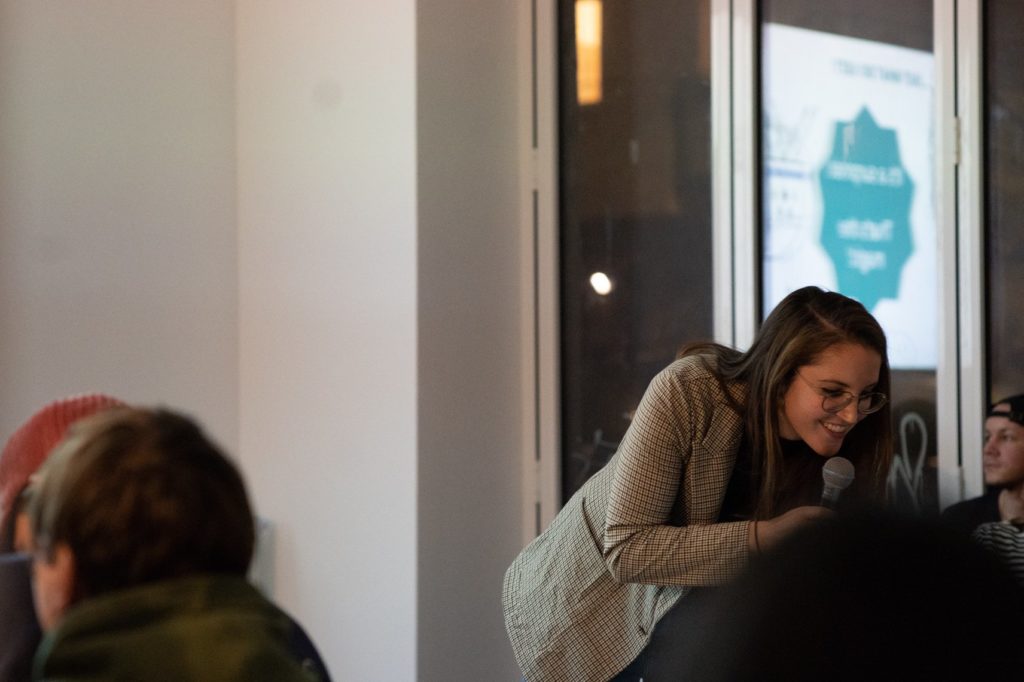
For the final part of her talk, there was a question session and with this there were some interesting insights. One audience member wanted to know if people were encouraged to bring their own containers to store food; after all, what’s the point in reducing one problem while exacerbating another? Franziska responded by saying yes, but that there are hygiene standards and laws in Germany which can sometimes make it difficult. However, the participating stores also have the option of using the compostable containers from the startup itself. Another audience member was concerned about choosing between vegetarian and vegan options in the context of the “a box of magic” concept. To this Franziska did say the concept needed some work, and it was difficult for stores which sold a variety of options, as it’s not really possible to say in advance what will be left at the end of the day.
After a few more questions, she wrapped the talk up by proposing a challenge to the audience – something the GreenBuzz team asked all the speakers to do. The challenge was for everyone in the audience to save their first meal during the weekend, and if we were all to do that, then we would save 140kg of carbon dioxide emissions.
Timo Schmitt: The Berliner Tafel
Our next speaker had a different spin on the topic of food waste. Timo started by introducing the concept of the Berliner Tafel, which is an organisation – a food bank in English – which collects unwanted food and gives it to the needy. The three pillars of the organisation focus on providing food for social facilities (Berliner Tafel Klassik), food for people with little to money at home (Laib und Seele), as well as teaching children about the topic of food waste, with cooking classes and so forth (Kimba). He highlights how he believes food waste to be the biggest scandal of modern times.
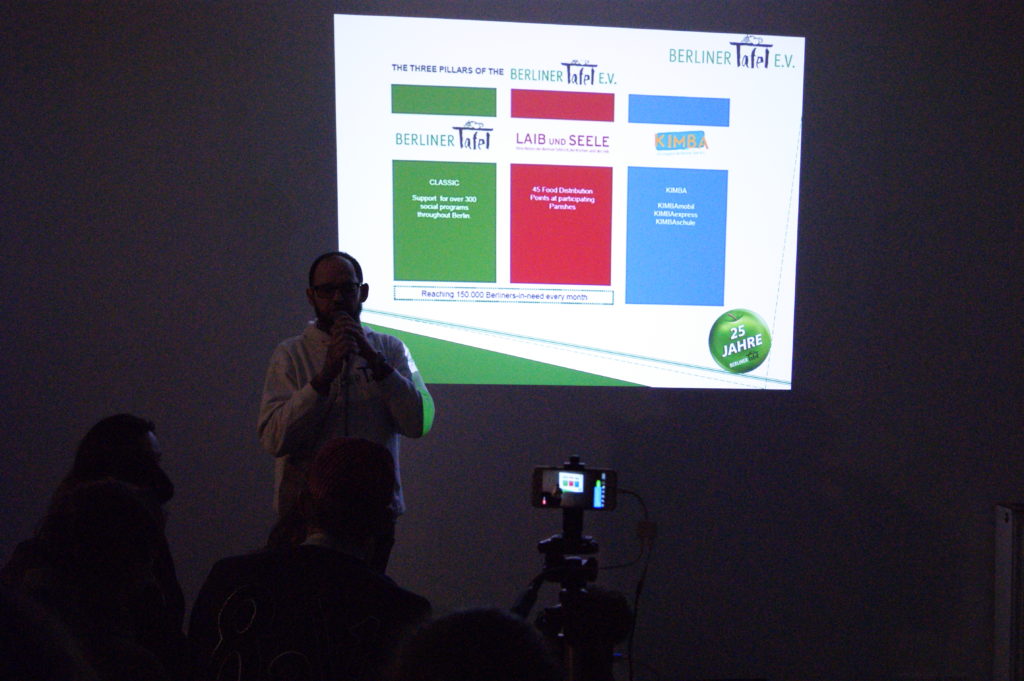
The next part of the talk was a video which explained how things started at the Berliner Tafel. One particular part that stood out, was how the volunteers at the start would be asked by bakers or supermarkets, “why do you want our trash?”. However, the point was that it wasn’t trash, it was perfectly good food. The response of the volunteers was that the quality of the food was the same at 5:55 when it could still be sold, and at 6:05 when it could not. This also ties in with a comment Timo made later on: language is powerful and we should change the way we talk about food waste. It is not food waste, it is leftovers, as waste has no value.
He then shared a little more behind the scenes info about the Tafel. For example, it is funded by donations and they refuse to take money from public institutions. In addition to this they have ran some campaigns aimed at raising money. One was called ‘Suppe mit Sinn’, where participating stores would add one euro to the price of a soup, which would then be donated to the Tafel. Another was an initiative at Schönefeld airport called ‘Spende dein Pfand’ which collected bottles from passengers at the airport; over the course of a year, the initiative succeeded in raising 164.754 euros (one hundred and sixty-four thousand, seven hundred and fifty-four euros).
When it came to the questions, there was one particular standout which led into the challenge that Timo proposed. Someone asked him if the Tafel manages to reach and help all the needy people in Berlin, to which he replied not at all. There are so many needy people that even with all of their resources, some people don’t get the help they need. His proposed method to combat this was also his challenge: to share a meal with a homeless person, every week for the rest of the year.
Raphael Fellmer: SirPlus
The final speaker of the evening was Raphael Fellmer, social entrepreneur and founder of the startup SirPlus. At the start he covered the general aspects of the ethos behind SirPlus, which are not too dissimilar to the reasons already mentioned; food waste is both terrible for the environment and an affront to those who are starving. However a major point he added was that not only are a lot of people starving in the west, but we are also importing foods from countries where even more people are starving, pricing them out and then throwing away the food regardless.
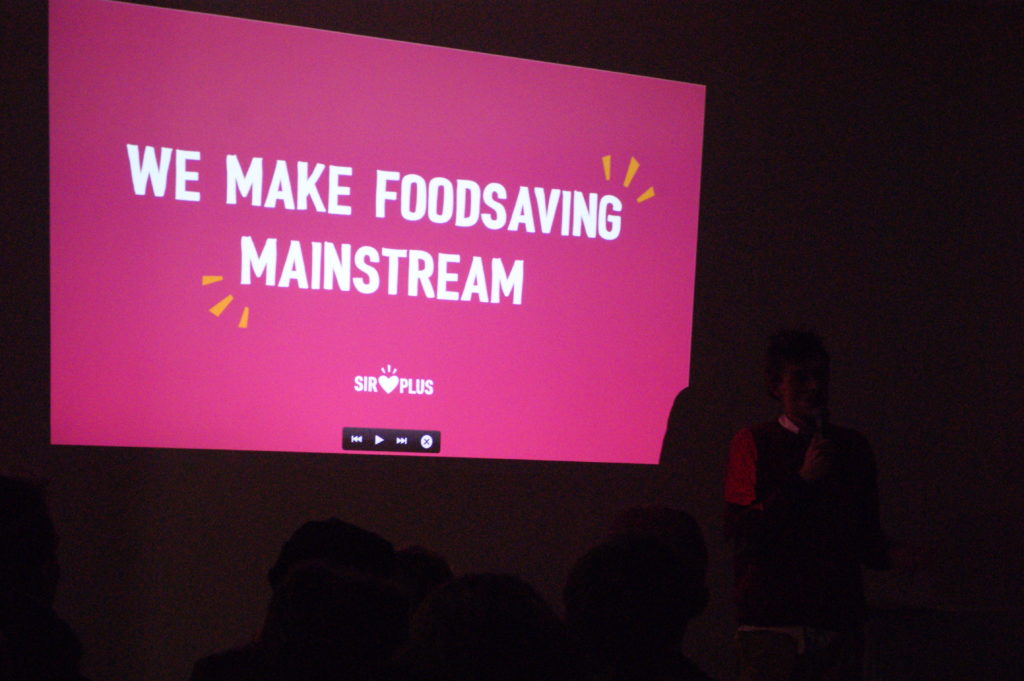
Moving on, he highlighted the four main issues of food waste: overproduction, societal impressions of what certain foods should look like to be considered edible, logistic failures and the best before date. In particular he focused on the final point. He said that a lot of people don’t realise there are two dates, a best before and a use by. Food should not be consumed after the use by date, but it is still perfectly fine to consume after the best before. He also mentioned that reducing food waste by 50% by 2030 is part of the Paris climate agreement.
After Raphael’s introduction, he delved more into the ins and outs of SirPlus specifically, talking about the physical locations (there are four in Berlin), that they have an online shop and the fact that they donate a lot of food to NGOs. He claims that they create a win-win-win situation: for the partners, for the consumers, as well as for the environment & society. The next point he made was that it’s important that we talk about big topics like this, and that saving the world should be done with a smile. His final remark was to bring up veganism, in particular saying that the amount of land we use for producing animal products is completely inefficient and that not only do we need to reduce our waste, but our land use as well; in fact, his challenge for the audience was to go vegan for a week.
As with the other speakers, there was time for some questions towards the end. Raphael was quizzed on the future of SirPlus, to which he said that he hopes to open 35 stores across Germany; however, the focus is on Berlin right now, then Germany and the EU in the future. He was also asked to clarify how much food can be saved out of the total amount, however he said it’s difficult to say for sure. He continued by telling us that most food waste occurs in the home, and most people are too rich or busy to care about saving small bits of food and that all of this adds up. He also stressed that it was a problem that politicians and businesses should try to address.
Closing words
After all our speakers had said their piece, another GreenBuzz member and organiser of the event Alice stood up to say thanks to everyone for coming along. In addition she gave a call to action for everyone who was there (and by extension those reading this): take on the challenges set by the speakers.
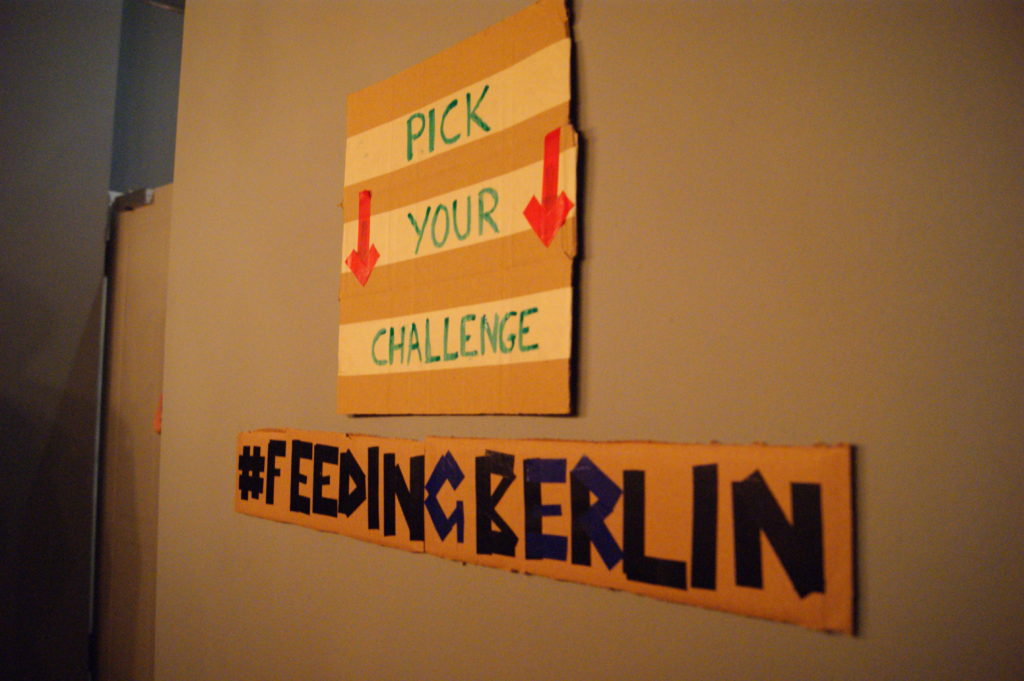
- Franziska – save a meal this weekend.
- Timo – share a meal a week with a homeless person in Berlin & start saying food leftovers instead of food waste.
- Raphael – go vegan for a week.
In addition to these challenges, a few others were set:
- Organise a dinner with your family/friends to raise awareness for food waste.
- Make soup with your leftovers.
If you take on these challenges, please share them on your social media using the hashtag #feedingberlin. By engaging with these challenges, we can try to spread the message to others in a unique way.
Finally, the quickpitches – where people have 1 minute to make a pitch, for whatever reason – rounded off the evening. If you’d like to see more about the speakers/projects, then check them out here.
The afterparty
As is the case with all sustainability drinks there is time for networking at the end of the event, though this time with a twist. Given the theme of the night was food leftovers – here we’re already taking the initiative with the challenges – there were a few organisations there who provided rescued food for the attendees; in attendance were SirPlus, The Real Junkfood Project and Foodsharing.
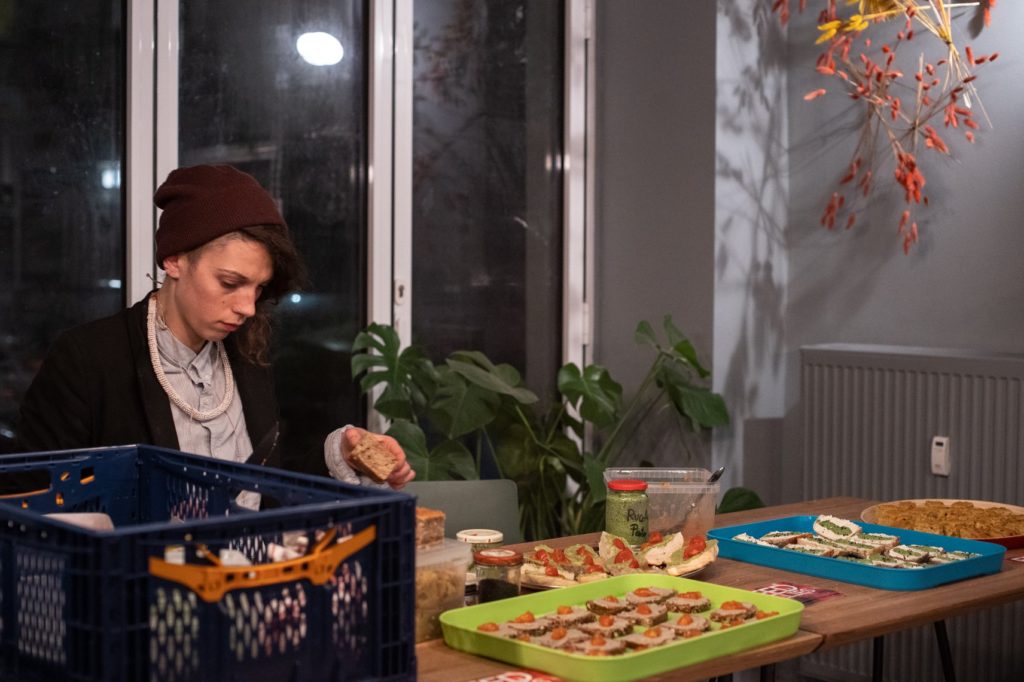
All in all, based on the reactions of the audience during the talks and the fact that people were still discussing the topic of the night as the hosts had to ask us to leave, it was a successful evening. Whether you were there or not, now is the time to spread the message around food leftovers, to take on the challenge and to make Berlin a more sustainable and fairer place to live.
- Why Do Gases Act As Greenhouse Gases? - November 12, 2019
- 3 Reasons Why Protecting Our Rivers Is Incredibly Important - September 22, 2019
- The 5 Most Abundant Greenhouse Gases and Where They Come From - September 6, 2019
